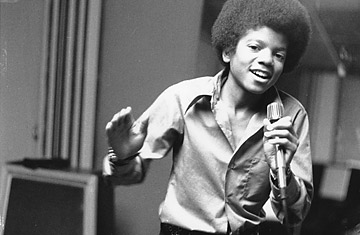
Michael Jackson at 13.
(2 of 2)
In 1993, Michael's sister LaToya, who is perhaps not the most reliable of witnesses, claimed that their mother Katherine had called Michael a "damn f----t." How strong is the bond, the bondage, of victim to victimizer? Strong enough that one never breaks free. Jackson dedicated his album Dangerous to "My dearest parents, Katherine and Joseph Jackson."
Michael's speaking and singing voice never matured; neither, it appears, did he. When Winfrey asked Jackson if he was a virgin, he smiled and said he was "a gentleman. You can call me old-fashioned, if you want." Old-fashioned? Archaic. Identifying with the don't-want-to-grow-up Peter Pan — a role he hoped to play in a Steven Spielberg film version of the James M. Barrie play — he called his ranch Neverland, populated it with an exotic menagerie and surrounded himself with young boys. They were meant to be supporting players in an improved, redeemed fantasy version of his own damaged childhood.
Yet Jackson's profound weirdness — not just the glove or the seaweed hair striping his face but the blanched skin, the pained eyes, the tremulous soul — hinted that Peter Pan was the wrong role for him. Wasn't Jackson really one of Peter's Lost Boys, stranded between childhood and adolescence, loved by the public yet feeling caged and abandoned, and searching, groping for the Edenic innocence he believed was any child's birthright? Or, to pick an image from another Disney cartoon classic, Neverland could also be Pinocchio's Pleasure Island, where careless lads were transformed into slaves and donkeys. And this pop-star Pan could instead be the Pied Piper, the musician who lured children into a cave as their parents gasped in fright.
"I love being around them," Jackson wrote in his 1988 autobiography, Moonwalk. "There always seem to be a bunch of kids over at the house, and they're always welcome. They energize me — just being around them." When he welcomed handicapped kids to the ranch, he felt he was their equal, and they were friends he could play with, or sing to — or, he must have thought, love, in the purest sense of the word. The litany of alleged misbehavior in the 2005 trial — making prank phone calls, sneaking drinks, scanning porn sites, even a lesson in masturbation — is not unfamiliar among preteens. If Jackson committed these acts, it was not predator-to-prey but peer-to-peer. Having forgiven the father who abused him, could he not forgive himself for bonding with the children who came into his Neverland bed? Could this Lost Boy even understand the difference between hugging and fondling, affection and assault, generosity and lechery?
He told Winfrey that what he most regretted not having as a kid was "slumber parties." That's what he arranged for his young guests, who were often wounded souls themselves. The boy who brought the complaint against Jackson that went to trial met him after undergoing chemotherapy treatments for leukemia as a 10-year-old. Perhaps we should forget Peter Pan for the moment, and remember that Jackson told Winfrey of his kinship with another outsider, John Merrick, that sweet-souled, tragically deformed creature known as the Elephant Man. "I love the story," he said. "It reminds me of me a lot ... It made me cry because I saw myself in the story."
Even when the charges of child abuse were new and shocking — when British gossip rags were dubbing him Wacko Jacko and Sicko Jacko — there was some sympathy for this sad creature. The public, after all, had more invested in him than they did in the boys he was accused of molesting. And now, in his early and sudden death, his mourners can see him as more sinned against than sinning. They might have used that magical memory wipe on themselves.
But as the first grieving fades, and all those people Jackson's lawyers paid to keep quiet get other people to pay for their stories, the tabloid tattling will return. The noise should be as instructive as it is ugly. It will force Michael Jackson's fans and foes to ask: Why must our stars fall so spectacularly and fail us so egregiously? Perhaps it's because we want them to. Indeed, it may be the primary function of celebrities like Jackson to show us, in their early radiance, what we could dream of being — and in the murk of their decline, what we fear we could become.
